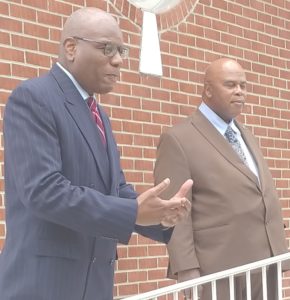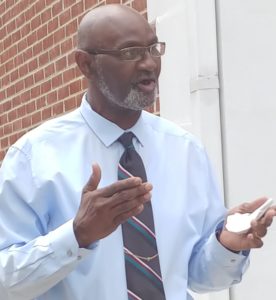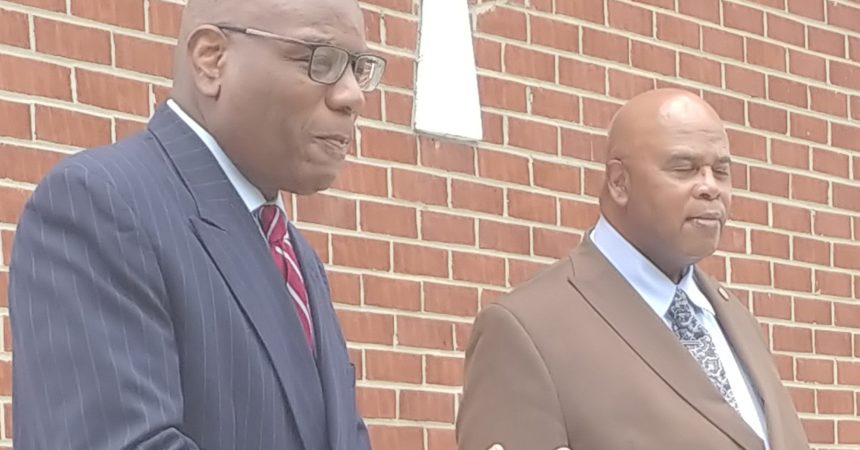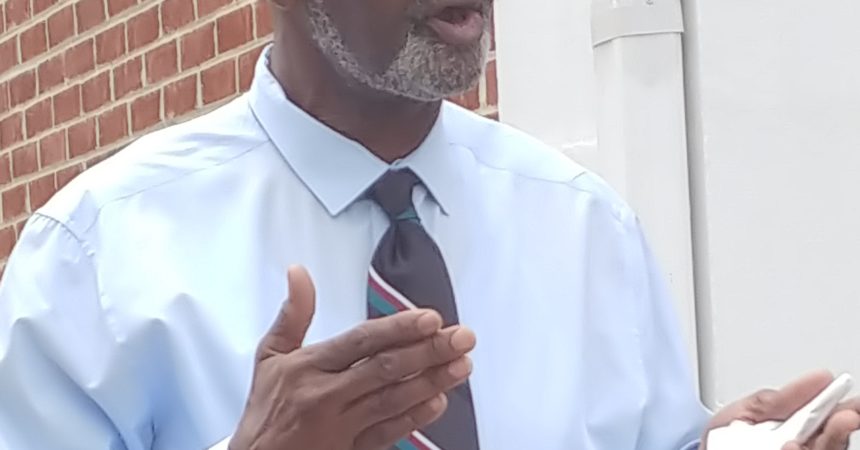Holmes calls on DeSantis to resolve felon voting rights, Medicaid and unemployment issues
A letter that’s seemingly intended to make sure that two major concerns aren’t overlooked amid the COVID-19 pandemic was sent to Gov. Ron DeSantis asking for his intervention.
In the letter dated April 29, Rev. RB Holmes asked DeSantis to increase the state’s unemployment pay and consider expanding Medicaid. Holmes, pastor at Bethel Missionary Baptist Church, took his case public during a press conference last Friday on the front lawn of his church.
During the press conference attended by Curtis Taylor, president of the Tallahassee chapter of the Urban League, and ex-felon Melvin Blackshare, Holmes also appealed to the governor to resolve the issue of restoring felons voting rights.
The argument for restoration of felons’ right to vote is currently in court, while Medicaid and unemployment compensation are at the center of discussion by members of DeSantis’ administration.
Central to Holmes’ contention is data that shows the three issues are disproportionately affecting Blacks and poor people.
“Please strongly consider increasing the unemployment benefit for hurting Floridians,” Holmes wrote in his letter to DeSantis. “I believe it is the moral and right thing to increase the $275.00 per week unemployment benefits.”

Standing with Curtis Taylor, president of the Tallahassee Urban League at his side, Rev. RB Holmes (left) makes a point during a press conference on the front lawn at Bethel Missionary Baptist Church.
Photo by St. Clair Murraine
Since the outbreak of coronavirus, thousands of Floridians have lost their jobs and have caused a spike in unemployment claims. While the April unemployment numbers haven’t been released, the Department of Labor said 660,438 claims were made in early March.
Glitches in filing unemployment claims have frustrated applicants and prompted some legislators to call the system “broken.”
“I’m asking the powers that be to extend (and) increase unemployment benefits for suffering Floridians during this virus crisis,” Holmes said during the press conference.
Throughout his letter, Holmes praised DeSantis for his standard of governance and his “attention to the health disparities in brown and Black communities.”
Some of the disparities are especially noticeable in rural communities, Holmes said in his letter. Expanding Medicaid could help in those cases, said Holmes, who is publisher of the Capital Outlook.
The Agency for Health Care Administration recently warned DeSantis to expect an increase in the number of Medicaid applicants because of the pandemic. The AHCA reported in March that an estimated 3.76 million poor, elderly and disabled people in Florida received health care through Medicaid.

Melvin Blackshare tells of the difficulties he’s faced as a felon attempting to return to society.
Photo by St. Clair Murraine
The argument over restoration of felons’ right to vote has been ongoing since November 2018 when voters overwhelmingly said yes to Amendment 4. The constitutional amendment calls for restoring voting rights to felons “who have completed all terms of their sentences, including parole and probation.”
However, legislators have since passed SB 7066, which requires felons to pay any outstanding fees before their right to vote could be restored. Amendment 4 supporters called the legislation discrimination against Blacks who make up the majority of more than 1 million returning citizens.
Holmes called on DeSantis to find “an administrative resolution” to the issue. He also suggested that the governor and legislators “sit down and find a resolution.”
The right to vote isn’t a partisan one but a moral and legal right, Holmes said.
“We don’t know how they’re going to vote; we just want them to vote,” he said.
The issue has been challenged in court by DeSantis, who suffered a setback in earlier this month when U.S. District Judge Robert Hinkle said he will outline a process for the state to allow felons to vote even if they can’t afford to pay “financial obligations.”
Blackshare, who was released eight years ago, can relate to the frustration others in his situation face. He said he was unaware that he owed back payments for parole supervision fees until he was recently told by his parole officer.
He hasn’t attempted to register to vote because of the outstanding fees, Blackshare said. Voter registration in the state is open until October and he isn’t sure he could make his payments by that date.
“You don’t come full circle until you get your voting rights back,” said Blackshare. “When you get out, you try to make the circle whole again but it won’t be complete until you get those rights.”
Blackshare said making any kind of payment to what he owes is difficult because he can’t find a job that pays much. Taylor said he’s heard similar stories from felons who have called the Urban League to assist with restoration of their right to vote.
“Everyone needs to vote,” Taylor said. “This election coming up is going to be one of the most important elections in our lifetime. It could have a profound effect on your life, your children and your children’s children.”









